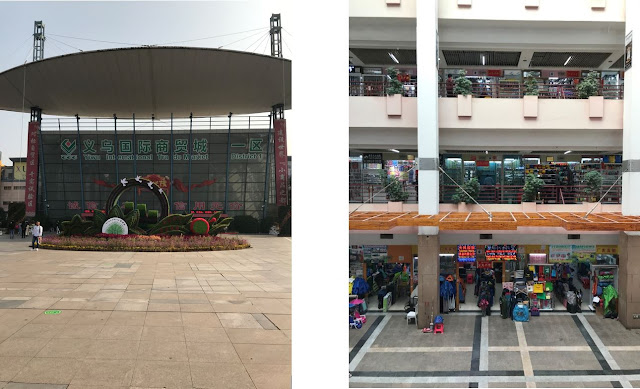Class Research Trips: Yiwu and Guangzhou
Student blogger, Brandy
Darling, shares her experience traveling with her class to two cities to
conduct individual research projects.
Since I am pursuing the Hopkins-Nanjing Center
Certificate + Johns Hopkins SAIS MA, I have elected to pursue one English class
in addition to the three required Chinese classes. In order to fulfill my
international political economy concentration on time when I return to SAIS, I
am taking an international law course named Injustices, Discrimination, and
Group Identity. In this class, we cover injustices such as genocide, racism,
and prejudices. We also learn how these issues are dealt with internationally, especially
in the United States and China. Our class research project is over
understanding how Africans are treated in Guangzhou, China. Guangzhou is also
known as ‘Little Africa’, as it has a relatively high concentration of Africans
working primarily in exporting businesses. In recent years, authorities have
tightened visa requirements, conducted hotel and even drug raids that target
Africans due to their distinction as foreigners based on their skin color.
Our class split up into five groups to look at
discrimination in Guangzhou from five different angles: business, gender,
religion, other foreigners, and discrimination as a whole. I joined the gender
group with three other Chinese students. We focused on four different topics:
homosexuality, female workers, interracial marriages, and—the topic I selected—interracial
children. I wanted to see if the same prejudice Africans face also affects
children who share elements of both Africans and Chinese people.
To begin our research, the class traveled to Yiwu, where
a large number of foreigners reside and work in export businesses. Yiwu is a
city not far from Nanjing (four hours on the bullet train) and it is one of the
world’s largest small commodity wholesale markets.
 |
| Yiwu International Trade Market. Thousands of small shops lie inside the market. |
My group spoke with many Chinese shop owners about their
experiences working with foreigners. It was difficult to conduct our research
in the shops in Yiwu because our topics are personal. Eventually we stumbled
upon our most important interview with two university students who talked about
their experiences living in Yiwu. We sat with them for about 30-45 minutes
discussing each of our topics. For my topic, they told us that they knew a few
people with half African and half Chinese children, mostly Nigerians. They said
that the children are ‘beautiful’ and ‘smart’ because they know so many
languages. Chinese people tend not to treat the children like they treat other
Chinese children because “they have a little bit of African, [so] they are just
African”—the children look different and they grow really fast. They said
Chinese children do not treat them differently, playing with the interracial
children without thinking about differences too much. This information was a
great start to my research.
 |
| My group members and I after we interviewed a Cameroonian and Ugandan about our various research projects in Yiwu. |
Our second research trip was to Guangzhou, where tens of
thousands of Africans live in neighborhoods such as Xiaobei and Tiaojin. On
this trip, my group members and I took a more individual approach. I worked
with my classmate studying interracial marriages because our research was
related. We met most of our interviewees at Sacred Heart Cathedral. After
church, we met dozens of interracial families and spoke with them about their
lives in China.
 |
| Sacred Heart Cathedral is a government-registered church that holds Catholic services in English every Sunday. |
 |
| My group mate, He Xueyan (or Shirley), plays with the child of an interracial couple she interviewed after church. |
Another day we traveled to Xiaobei, spoke with many
Chinese shop owners, and met a family on Baohan Street working at their
clothing shop. The mother was from Guangzhou and the father was from Cameroon.
He had lived in China for ten years without returning home, and has a
9-year-old daughter and 6-month-old son with his Chinese wife. The daughter
speaks English, Cantonese, Mandarin, and French, and attends a French
International School where her father claims she has many Chinese friends. When
I asked how Chinese people treat his children, the father told me that
sometimes people are confused but generally they do not receive bad reactions.
 |
| A half-Chinese, half-Cameroonian baby playing with bystanders outside of his parents' clothing shop. We interviewed his parents about their marriage and how they choose to raise their children. |
Over the course of my research, I realized that Chinese
people in Guangzhou generally had a favorable view of interracial children.
They often described the children as beautiful and smart, as the two African
students we met in Yiwu said. I did not observe any negative interactions
between Chinese people and the interracial children. The research trips were
beneficial in practicing how to conduct cross-cultural field research. When we
returned to Nanjing we presented our findings to the campus community. We also
turned in a research paper in class to receive a grade.
 |
| My team and I present our research findings to the campus community. |
Written by Brandy
Darling, HNC Certificate '20 + Johns Hopkins SAIS MA '21

